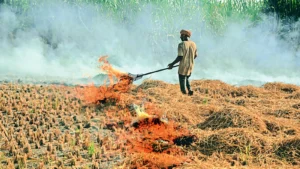Context:

Ahead of the winter season, the Central Government has directed the northern States of Punjab, Haryana, Uttar Pradesh, and Rajasthan to intensify awareness campaigns on stubble management to curb the annual problem of air pollution caused by crop residue burning.
Key Highlights / Details:
- The Issue:
- Crop residue or stubble burning, particularly after the paddy harvest, is a major contributor to severe air pollution across north India during October–November.
- The practice emits large amounts of carbon monoxide, methane, and particulate matter (PM 2.5 and PM 10), worsening smog conditions in the National Capital Region (NCR).
- The problem peaks during the post-monsoon season, coinciding with stagnant weather and low wind speeds that trap pollutants.
- Government Directions:
- The Centre, through the Union Ministry of Agriculture and Farmers Welfare, held a high-level meeting with senior officials of the four states to review progress on Crop Residue Management (CRM).
- States were instructed to:
- Strengthen public awareness drives on sustainable stubble management.
- Engage farmers’ cooperatives and panchayats in monitoring and compliance.
- Promote in-situ management machinery (like Happy Seeder, Super Straw Management System) and ex-situ solutions such as biomass-based power plants.
- The Centre emphasized that district-level officers should be actively involved in local campaigns.
- Financial and Policy Support:
- The Union Government has allocated funds under the Central Sector Scheme on Crop Residue Management (launched in 2018) for subsidizing farm machinery and awareness programmes.
- So far, over 2.5 lakh crop residue management machines have been distributed in Punjab, Haryana, and UP.
- The scheme also supports the establishment of Custom Hiring Centres (CHCs) to provide machinery access to small and marginal farmers.
- Expert Concerns:
- Despite policy efforts, farmers continue to burn stubble due to high costs of residue management, short harvesting-to-sowing window (10–15 days), and labour shortages.
- Experts stress the need for behavioural change and incentive mechanisms, not just penalties, to achieve lasting impact.
Relevant Prelims Points:
- Stubble Burning: The deliberate setting fire to paddy residue after harvest, mainly in Punjab and Haryana.
- Happy Seeder: A tractor-mounted device that sows wheat without removing or burning paddy stubble.
- PM 2.5: Particulate matter less than 2.5 micrometres — can penetrate deep into lungs and cause respiratory diseases.
- Crop Residue Management (CRM) Scheme: A Central Sector Scheme launched in 2018 to promote in-situ management.




